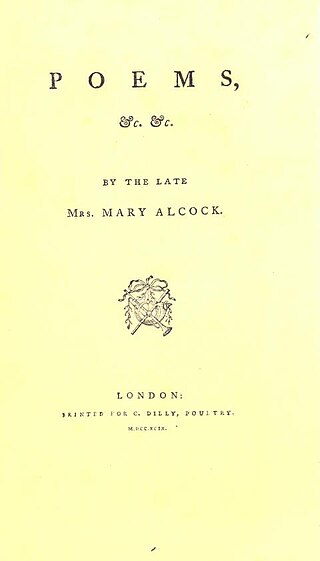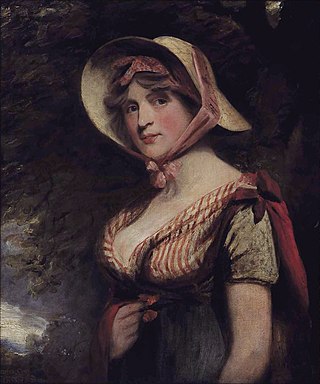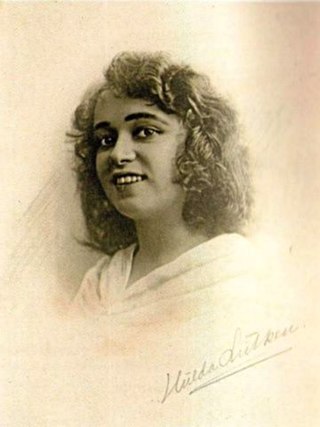Related Research Articles

Elizabeth Fry, sometimes referred to as Betsy Fry, was an English prison reformer, social reformer, philanthropist and Quaker. Fry was a major driving force behind new legislation to improve the treatment of prisoners, especially female inmates, and as such has been called the "Angel of Prisons". She was instrumental in the 1823 Gaols Act which mandated sex-segregation of prisons and female warders for female inmates to protect them from sexual exploitation. Fry kept extensive diaries, in which she wrote explicitly of the need to protect female prisoners from rape and sexual exploitation.

John Charles Spencer, 3rd Earl Spencer,, styled Viscount Althorp from 1783 to 1834, was a British statesman and abolitionist. He was Chancellor of the Exchequer under Lord Grey and Lord Melbourne from 1830 to 1834. Due to his reputation for integrity, he was nicknamed "Honest Jack".

George Child Villiers, 5th Earl of Jersey, GCH, PC, previously George Villiers and styled Viscount Villiers until 1805, was a British courtier and Conservative politician from the Villiers family.

Dido Elizabeth Belle was a free black biracial British gentlewoman. She was born into slavery and illegitimate; her mother, Maria Belle, was an enslaved Black woman in the British West Indies. Her father was Sir John Lindsay, a British career naval officer who was stationed there; later knighted and promoted to admiral. Lindsay took Belle with him when he returned to England in 1765, entrusting her upbringing to his uncle William Murray, 1st Earl of Mansfield, and his wife Elizabeth Murray, Countess of Mansfield. The Murrays educated Belle, bringing her up as a free gentlewoman at their Kenwood House, together with another great-niece, Lady Elizabeth Murray, whose mother had died. Lady Elizabeth and Belle were second cousins. Belle lived there for 30 years. In his will of 1793, Lord Mansfield provided an outright sum and an annuity to her.

The Randolph family of Virginia is a prominent political family, whose members contributed to the politics of Colonial Virginia and Virginia after statehood. They are descended from the Randolphs of Morton Morrell, Warwickshire, England. The first Randolph in America was Edward Fitz Randolph, who settled in Massachusetts in 1630. His nephew, William Randolph, later came to Virginia as an orphan in 1669. He made his home at Turkey Island along the James River. Because of their numerous progeny, William Randolph and his wife, Mary Isham Randolph, have been referred to as "the Adam and Eve of Virginia". The Randolph family was the wealthiest and most powerful family in 18th-century Virginia.
Frederick Mason Trench, 2nd Baron Ashtown DL was an Irish peer and magistrate.

Mary Alcock was an English poet, essayist, and philanthropist. She was part of Lady Anne Miller's literary circle in Bath.
Thomas Jones, called "Thomas Jones of Denbigh" to differentiate him from namesakes, was a Welsh Methodist clergyman, writer, editor and poet, active in North Wales.

Frances Elizabeth Jocelyn, Viscountess Jocelyn, VA was a British courtier and amateur photographer. She was born as the youngest daughter of Peter Cowper, 5th Earl Cowper and his wife Emily Lamb. However, some have speculated that she and her brother William were fathered by Henry John Temple, 3rd Viscount Palmerston, whom Lady Cowper married in 1839, after Cowper's death. Before her marriage, Lady Frances served as one of the trainbearers at the coronation of Queen Victoria, and she also served as a bridesmaid at the wedding of the queen to Prince Albert in 1840.

Josiah Ogden Hoffman was an American lawyer and politician.
Events from the year 1857 in the United States.
HMS Weymouth was a 44-gun fifth rate of the Royal Navy. She was previously the merchantman Wellesley, built in Calcutta in 1796. She successfully defended herself against a French frigate, and made two voyages to Britain as an East Indiaman for the East India Company. The Admiralty purchased her in May 1804; she then became a storeship in 1806. On her last voyage for the Royal Navy, in 1820, she carried settlers to South Africa. She was then laid up in ordinary. In 1828, she was converted to a prison ship and sailed to Bermuda where she served as a prison hulk until 1865 when she was sold for breaking up.

Sir Charles Abraham Elton, 6th Baronet was an English officer in the British Army and an author.

Louisa Manners Tollemache, 7th Countess of Dysart was a peer in the Scottish peerage in a flourishing family. Her father held considerable estates in England largely due to the two marriages of Elizabeth Maitland, Duchess of Lauderdale, earlier Tollemache, née Elizabeth Murray. Her elder brothers left no surviving issue on their deaths which enabled her to enjoy and help to pass on to her descendants the key family settlement properties: Helmingham Hall and Ham House in England.
Adelaide O'Keeffe was an author and children's poet, and an amanuensis for her father, noted novelist and poet, John O’Keeffe. She was known for her children's poetry and published verse novel for children.
Sir Andrew Bayntun-Rolt, 2nd Baronet (1755–1816), of Spye Park, Bromham, Wiltshire, was a British politician who sat in the House of Commons from 1780 to 1786.

John Pearson was a British Barrister and Advocate-General of Bengal.
Sir John Lowther Johnstone, 6th Baronet (1783–1811) was a British Army officer and politician.

Hulda Dagny Lütken (1896–1946) was a Danish poet and novelist. The underlying theme in her nine poetry collections and five novels is the conflict between desire and moral purity. Her first novel, Degnens Hus, is based on her own experience of two very different parents. Initially writing rather traditional rhyming verse, Drømmen, published in 1940, was the first of more experimental works. In 1943, with her memoir Mennesket paa Lerfødder she embarked on a period of self-reflection questioning her gender identity.
References
- 1 2 3 4 5 6 7 8 9 10 "Ham, Elizabeth (1783–1859), poet and writer" . Oxford Dictionary of National Biography (online ed.). Oxford University Press. 2004. doi:10.1093/ref:odnb/45850 . Retrieved 23 September 2022.(Subscription or UK public library membership required.)
- ↑ "Womens Autobiographies, Parts 1 and 2". www.ampltd.co.uk. Retrieved 24 September 2022.
- ↑ "Party with the Parts of Speech: The Infant's Grammar by Elizabeth Ham". Cotsen Children’s Library. 26 September 2020. Retrieved 24 September 2022.
- ↑ "Publications Received". The Spectator. F.C. Westley: 498. 1845. Retrieved 24 September 2022.
- ↑ Ferguson, Moira (1 August 2014). Subject to Others (Routledge Revivals): British Women Writers and Colonial Slavery, 1670-1834. Routledge. ISBN 978-1-317-63487-4 . Retrieved 24 September 2022.
- ↑ "Elizabeth Ham | Orlando". orlando.cambridge.org. Retrieved 24 September 2022.